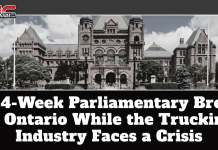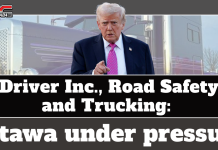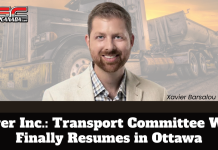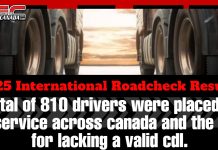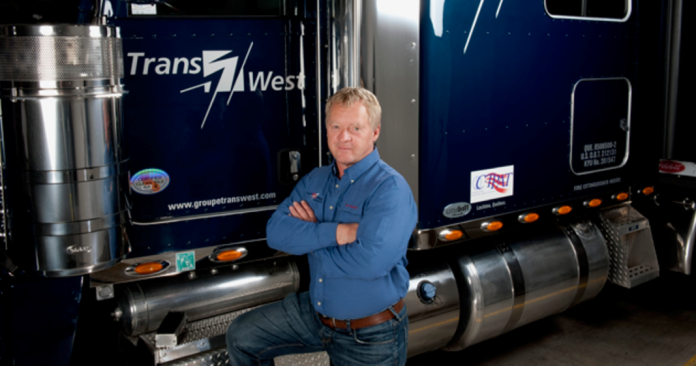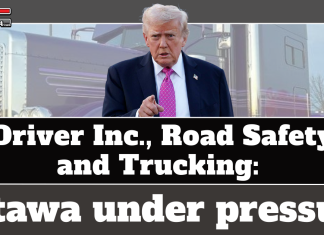Réal Gagnon, founder of Trans-West, has publicly taken a stand against the issue of the Driver Inc model, denouncing a practice that, in his view, is severely damaging the trucking industry.
He strongly criticized the federal government’s inaction, accusing them of failing to “step up” and regulate this situation fairly for all carriers. For Réal, it is essential that the rules are the same for everyone to avoid penalizing companies that comply with the law and pay their employees fairly.
“The federal government should regulate and establish equal rules for everyone. I don’t blame the guy who takes a job because he has no choice. He doesn’t know there’s another option because this is all he’s being offered. This is a major problem for the industry,” he explained.
The Impact of “Driver Inc” on the Industry
According to Réal, the issue with incorporated drivers lies in the fact that many of them are forced into this status without understanding the implications. They are often unaware of the benefits they lose, unlike those directly employed by companies like Trans-West, where drivers receive protections such as insurance and social benefits. Hiring drivers traditionally, he noted, is much more costly for companies like his, creating unfair competition.
He explained that an incorporated driver in Ontario costs a company an average of 56 cents per mile, whereas hiring a driver with full benefits costs around 90 cents per mile. This cost difference of over 30 cents per mile forces compliant companies to either reduce their profit margins or lose contracts to competitors using these practices. Over 40 million miles, a 30-cent per mile difference represents several million dollars annually—more than the company’s profit.
Economic Struggles for Transport Companies
“This affects our profitability under these conditions,” Gagnon lamented. “Without profit, you can’t finance new equipment. Forget about buying trucks—they cost between $220,000 and $250,000. Trailers now cost $100,000.”
Transport companies are finding it increasingly difficult to maintain profit margins amidst these unfair “Driver Inc” practices. With high costs for fuel and driver wages, staying competitive becomes harder without compromising profitability. He emphasized that strong financial results are essential for securing financing.
“If you’re financing and don’t have results, things don’t go well,” added Réal.
He also pointed out that while new trucks perform well for the first four or five years, they eventually require either replacement or repairs. The same goes for insurance: everything runs smoothly as long as trust funds are managed effectively, but any breakdown in management can create financial problems for companies.
Price Pressure and Dangerous Compromises
Réal also highlighted how intense competition in the trucking sector has forced him to lower prices to retain clients, such as reducing rates by up to $800 for trips to California. This pressure to remain competitive is pushing transport companies into making dangerous compromises, and Gagnon fears for the future of the industry if nothing is done to regulate incorporated driver practices.
The core issue, according to him, is that these practices not only hurt companies but also harm the drivers themselves. Réal urges the government to act swiftly to restore fairness and protect trucking workers.
“These guys, often immigrants, come here hoping to build a better life. They get their licenses—apparently without much difficulty—sign a paper, and suddenly they’re driving a truck. It must feel like a dream for them! But over time, they realize things don’t add up. I’ve even heard that some drivers had to finance their own fuel to fill up the truck… They end up with huge credit card bills and nothing coming in.”
One of the trucking industry’s biggest challenges is finding enough drivers to operate the trucks. But if the government doesn’t act quickly, in Ontario, the only available workforce will be incorporated drivers. Even strong, viable companies like Trans-West might be forced to offer incorporated driver positions just to fill seats behind the wheel. Drivers often choose to incorporate because they see short-term financial gains, such as higher take-home pay, without realizing the long-term disadvantages.
“This spring, we wanted to bring in 16 drivers to the Brampton area. During training, the first question they asked was whether they would pay taxes or be incorporated. We explained they had to pay their dues, and none of them stayed.”
Tax Inequity Between Quebec and Ontario
In Quebec, the vast majority of companies pay all their social charges and taxes transparently, which is not always the case in Ontario. According to Réal Gagnon, it is crucial for policymakers to understand this reality and implement measures to regulate the industry.
These practices have been tolerated for too long, and Réal believes the government is out of touch with the realities faced by transporters. He compares the situation to a “dead end,” where law-abiding companies find themselves stuck, unable to compete with those benefiting from tax advantages. In his view, the government is “asleep at the wheel,” choosing to ignore the impact this has on the industry rather than taking firm action to restore fairness. Is it a matter of politics?
Advantageous Financing for Some Carriers
The favorable financing that some carriers receive through community or religious networks allows them to purchase trucks without going through traditional financing channels. This unregulated practice creates an even more challenging environment for companies like Trans-West, which must negotiate loans with traditional financial institutions subject to strict checks.
“In Ontario, it’s like playing hockey four against five. The rules aren’t the same for everyone, and it’s holding the industry hostage. We’ve worked hard for what we have today, but we can’t keep going like this indefinitely. The government needs to act.”
An Urgent Call for Reform
Réal Gagnon is calling for swift changes within the next six months, hoping that the government will finally take the necessary steps to regulate the “Driver Inc” model. For him, it is imperative that all carriers operate under the same rules, just like in a hockey game where all teams play by the same regulations.
Trans-West: A Transparent Business Model That Respects Its Drivers
Unlike the practices of “Driver Inc”, where workers are often left without social protections, Trans-West offers a transparent and fair business model that respects the needs of its drivers.
 Réal Gagnon has always been able to adapt to the demands of modern transportation and the needs of his employees. At Trans-West, team driving allows drivers to quickly cover routes between Montreal and California, often in just five days. This system, based on flexibility and transparency, has helped retain employees and allowed the company to navigate difficult times, such as the recession, without losing staff. Today, Trans-West continues to grow, with plans to add 30 trucks and 50 refrigerated trailers.
Réal Gagnon has always been able to adapt to the demands of modern transportation and the needs of his employees. At Trans-West, team driving allows drivers to quickly cover routes between Montreal and California, often in just five days. This system, based on flexibility and transparency, has helped retain employees and allowed the company to navigate difficult times, such as the recession, without losing staff. Today, Trans-West continues to grow, with plans to add 30 trucks and 50 refrigerated trailers.
The company president believes that one of Trans-West’s key strengths is its ability to adapt to market fluctuations. By offering flexible working conditions and strong social benefits, Réal ensures that every driver in his company can meet their mileage goals while maintaining high job satisfaction.
A Bold Vision for the Future
“I grew up in the trucking industry, and I’m proud of that. I’ve learned a lot, and we continue to learn. It’s a constantly evolving market, and we never get bored. I decided to go out on my own to focus on California, a market I saw as a unique opportunity. Back then, it was mostly Americans covering California—today, it’s Canadian carriers.”
Driven by this passion, Réal Gagnon made the decision at 18 or 19 to leave the family trucking business and venture out on his own. He wanted to specialize in transporting goods to California, a market that was still largely untapped by Quebec carriers at the time. Despite his father’s reservations, Réal persisted and succeeded.

